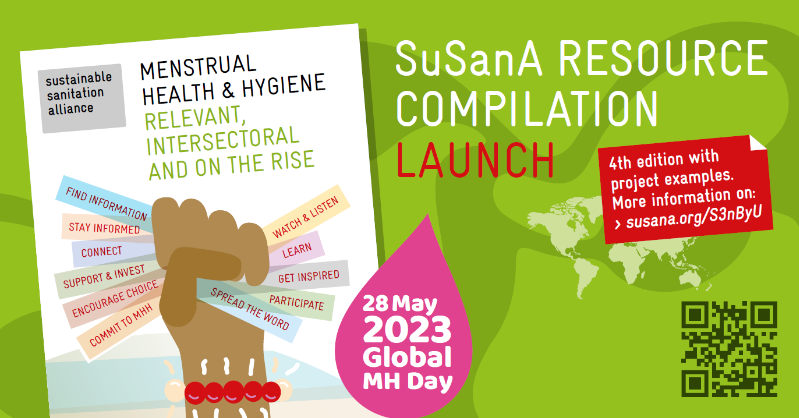- Equity, inclusion and sanitation workers
- Menstrual health and hygiene (MHH) or Menstrual hygiene management (MHM)
- Awareness raising and reducing taboos
- Commit to MHH: Action and Investment
- Introduction to Commit to MHH: Action and Investment
Introduction to Commit to MHH: Action and Investment
1984 views
- secretariat
-
 Topic Author
Topic Author- Moderator
- SuSanA secretariat currently allocates 2 full time person equivalents of time from members of GIZ Sustainable Sanitation Team: Arne Panesar, Alexandra Dubois, Maren Heuvels, Teresa Häberlein, Daphne Manolakos and Bettina-Sophie Heinz.
More than 1.9 billion people menstruate worldwide. No matter which field you work in, MHH plays a role for your staff, partners and target groups. A commitment to MHH in your project does not need to be a major component, even small changes can be a first step, such as including MHH awareness in regular training or creating a period-friendly environment for your staff. Here are some big and small examples of how MHH has been integrated into different programmes and working environments.
Key Components of a Period-Friendly Toilet
Period-friendly toilets are essential in ensuring the safety, privacy, and hygiene of women and girls. These facilities must be designed with key features in mind, such as gender-segregation, functional lighting, lockable doors, handwashing facilities with water and soap, and covered bins for menstrual waste disposal. Additionally, these toilets should be accessible and affordable to all, including those with disabilities or limited financial resources.
Improving access to water, sanitation, and hygiene (WASH) facilities in schools is essential for enabling girls to manage menstruation appropriately and ensuring that it does not become a barrier to their education. By prioritizing the design and maintenance of period-friendly toilets and promoting the importance of menstrual hygiene management, we can create safer, more inclusive, and equitable spaces for all.
👉 publichealth.columbia.edu: bit.ly/3OgnTTB
👉 fitforschool.international: bit.ly/3WgNqhK
👉 menstrualhygieneday.org: bit.ly/3OjrWP9
Empower Girls with the free MHM Education Guide
WASH United, 2018
For girls to manage their periods safely, hygienically and without shame, they need a basic understanding of what menstruation is and how to handle it. Unfortunately, millions of girls lack access to even minimal information on menstruation.
WASH United’s MHM Education Guide, developed together with girls and teachers, is a compact, easy-to-use, and low-cost solution. It is available for free in more than
20 languages: English, French, Spanish, Arabic, Nepali, Amharic, Kiswhahili, Hindi and many more Indian languages.
👉 www.wash-united.org/mhm-guide/mhm-guide.html
Priority List of Indicators for Girls’ Menstrual Health and Hygiene
Technical Guidance for National Monitoring
Global MHH Monitoring Group, Columbia University New York, 2022
Adequate and validated indicators are essential for tracking progress on addressing menstrual health and hygiene as an important health, education, gender equality,
and water, sanitation, and hygiene (WASH) issue. Monitor your menstrual health and hygiene using activities based on priority indicators and measures for advancing girls' menstrual health and hygiene to support national and global monitoring.
👉 susana.org/ojgQG8
Period Positive Workplaces
Period positive workplaces can increase employee productivity and reduce absenteeism for people who menstruate. Organizations become stronger and more inclusive by providing for menstrual needs. Join organizations around the world to become a Period Positive Workplace and receive complimentary certification by applying here.
👉 www.periodpositiveworkplace.org
#FreeTheTampons
Free menstrual products in workplaces, schools, universities, and other public institutions
Free toilet paper, soap, and seat covers are provided in public restrooms, but menstrual products are often overlooked. Together, we can normalize freely accessible
tampons and pads. More and more companies, universities, and municipalities recognize the importance of providing free menstrual products to support health and well-being
and break down stigmas. Scotland and Kenya have made progress in providing free period products. By sharing success stories and advocating for menstrual equity, we can ensure that menstrual products are accessible to all who need them.
👉 www.freethetampons.org
Key Components of a Period-Friendly Toilet
Period-friendly toilets are essential in ensuring the safety, privacy, and hygiene of women and girls. These facilities must be designed with key features in mind, such as gender-segregation, functional lighting, lockable doors, handwashing facilities with water and soap, and covered bins for menstrual waste disposal. Additionally, these toilets should be accessible and affordable to all, including those with disabilities or limited financial resources.
Improving access to water, sanitation, and hygiene (WASH) facilities in schools is essential for enabling girls to manage menstruation appropriately and ensuring that it does not become a barrier to their education. By prioritizing the design and maintenance of period-friendly toilets and promoting the importance of menstrual hygiene management, we can create safer, more inclusive, and equitable spaces for all.
👉 publichealth.columbia.edu: bit.ly/3OgnTTB
👉 fitforschool.international: bit.ly/3WgNqhK
👉 menstrualhygieneday.org: bit.ly/3OjrWP9
Empower Girls with the free MHM Education Guide
WASH United, 2018
For girls to manage their periods safely, hygienically and without shame, they need a basic understanding of what menstruation is and how to handle it. Unfortunately, millions of girls lack access to even minimal information on menstruation.
WASH United’s MHM Education Guide, developed together with girls and teachers, is a compact, easy-to-use, and low-cost solution. It is available for free in more than
20 languages: English, French, Spanish, Arabic, Nepali, Amharic, Kiswhahili, Hindi and many more Indian languages.
👉 www.wash-united.org/mhm-guide/mhm-guide.html
Priority List of Indicators for Girls’ Menstrual Health and Hygiene
Technical Guidance for National Monitoring
Global MHH Monitoring Group, Columbia University New York, 2022
Adequate and validated indicators are essential for tracking progress on addressing menstrual health and hygiene as an important health, education, gender equality,
and water, sanitation, and hygiene (WASH) issue. Monitor your menstrual health and hygiene using activities based on priority indicators and measures for advancing girls' menstrual health and hygiene to support national and global monitoring.
👉 susana.org/ojgQG8
Period Positive Workplaces
Period positive workplaces can increase employee productivity and reduce absenteeism for people who menstruate. Organizations become stronger and more inclusive by providing for menstrual needs. Join organizations around the world to become a Period Positive Workplace and receive complimentary certification by applying here.
👉 www.periodpositiveworkplace.org
#FreeTheTampons
Free menstrual products in workplaces, schools, universities, and other public institutions
Free toilet paper, soap, and seat covers are provided in public restrooms, but menstrual products are often overlooked. Together, we can normalize freely accessible
tampons and pads. More and more companies, universities, and municipalities recognize the importance of providing free menstrual products to support health and well-being
and break down stigmas. Scotland and Kenya have made progress in providing free period products. By sharing success stories and advocating for menstrual equity, we can ensure that menstrual products are accessible to all who need them.
👉 www.freethetampons.org
Posted by a member of the SuSanA secretariat held by the GIZ Sector Program Water Policy – Innovations for Resilience
Located at Deutsche Gesellschaft für Internationale Zusammenarbeit (GIZ) GmbH, Bonn, Germany
Follow us on facebook: www.facebook.com/susana.org, linkedin: www.linkedin.com/company/sustainable-sanitation-alliance-susana.
Located at Deutsche Gesellschaft für Internationale Zusammenarbeit (GIZ) GmbH, Bonn, Germany
Follow us on facebook: www.facebook.com/susana.org, linkedin: www.linkedin.com/company/sustainable-sanitation-alliance-susana.
Attachments:
-
 SuSanA-MHH...25-7.png
(Filesize: 179KB)
SuSanA-MHH...25-7.png
(Filesize: 179KB)
Please Log in to join the conversation.
You need to login to reply
Share this thread:
- Equity, inclusion and sanitation workers
- Menstrual health and hygiene (MHH) or Menstrual hygiene management (MHM)
- Awareness raising and reducing taboos
- Commit to MHH: Action and Investment
- Introduction to Commit to MHH: Action and Investment
Recently active users. Who else has been active?
Time to create page: 0.381 seconds







